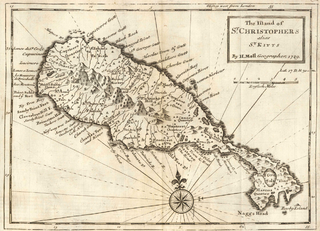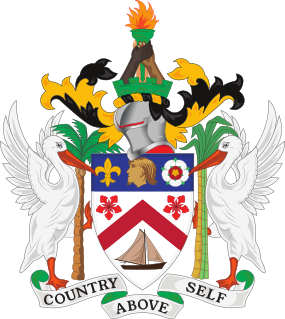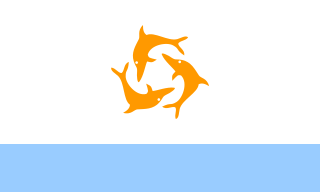 |
|---|
General elections were planned to be held in Anguilla on 25 October 1967 following the Anguillian Revolution in May. However, only five candidates stood for the five seats, with all elected unopposed.
 |
|---|
General elections were planned to be held in Anguilla on 25 October 1967 following the Anguillian Revolution in May. However, only five candidates stood for the five seats, with all elected unopposed.
The St Kitts-Nevis-Anguilla federation was established in February 1967, but was unpopular on Anguilla. In March Government House was burnt down and the island's warden fled to St Kitts. [1] On 30 May the federation police were forcibly ejected from the island and a "Peace Keeping Committee" installed as a government, [2] chaired by Walter Hodge. [3] A referendum on separating from St Kitts and Nevis was held on 11 July, in which 99.7% voted in favour of separation. [2] Independence was declared the following day as the Republic of Anguilla. [4]
A new constitution was drafted by Roger Fisher of Harvard University in July 1967, which provided for a seven-seat Legislative Council, of which five were elected and two were appointed, [3] and elections were scheduled for 25 October. [5] A new political party, the Anguilla Democratic Party, was set up to contest the elections. However, this caused division within the island's leadership and the party was disbanded in mid-October. [5]
Although seven candidates were initially announced, two withdrew (Camile Connor and Charles Fleming), leaving only five on nomination day, 17 October (Collins Hodge, John Hodge, Hugo Rey, Wallace Rey and Ronald Webster). The five were declared elected unopposed. [1]
The newly elected Council met on 21 October and Webster was elected chair. [1] Bob Rogers and Campbell Fleming were appointed as the nominated members. [3]

Anguilla is a British Overseas Territory in the Caribbean. It is one of the most northerly of the Leeward Islands in the Lesser Antilles, lying east of Puerto Rico and the Virgin Islands and directly north of Saint Martin. The territory consists of the main island of Anguilla, approximately 16 miles long by 3 miles (5 km) wide at its widest point, together with a number of much smaller islands and cays with no permanent population. The territory's capital is The Valley. The total land area of the territory is 35 square miles (91 km2), with a population of approximately 15,753 (2021).

Nevis is a small island in the Caribbean Sea that forms part of the inner arc of the Leeward Islands chain of the West Indies. Nevis and the neighbouring island of Saint Kitts constitute one country: the Federation of Saint Kitts and Nevis. Nevis is located near the northern end of the Lesser Antilles archipelago, about 350 kilometres (220 mi) east-southeast of Puerto Rico and 80 kilometres (50 mi) west of Antigua. Its area is 93 square kilometres (36 sq mi) and the capital is Charlestown.

Saint Kitts and Nevis, officially the Federation of Saint Christopher and Nevis, is an island country and microstate consisting of the two islands of Saint Kitts and Nevis, both located in the West Indies, in the Leeward Islands chain of the Lesser Antilles. With 261 square kilometers of territory, and roughly 50,000 inhabitants, it is the smallest sovereign state in the Western Hemisphere, in both area and population, as well as the world's smallest sovereign federation. The country is a Commonwealth realm, with Charles III as King and head of state. It is the only sovereign federation in the Caribbean.

Saint Kitts and Nevis have one of the longest written histories in the Caribbean, both islands being among Spain's and England's first colonies in the archipelago. Despite being only two miles apart and quite diminutive in size, Saint Kitts and Nevis were widely recognized as being separate entities with distinct identities until they were forcibly united in the late 19th century.
The history of Anguilla runs from the beginning of human habitation, probably via settlement from South America, through its colonization by the English in the early modern period, to the present day. Following a series of rebellions and a short-lived period as an independent republic during the 1960s, Anguilla has been a separate British overseas territory since 1980.

Robert Llewellyn Bradshaw was the first Premier of Saint Kitts and Nevis, and previously served as Chief Minister, legislator, and labour activist.

Saint Christopher-Nevis-Anguilla was a British colony in the West Indies from 1882 to 1983, consisting of the islands of Anguilla, Nevis, and Saint Christopher. From 1882 to 1951, and again from 1980, the colony was known simply as Saint Christopher and Nevis. Saint Christopher and Nevis gained independence in 1983 as the Federation of Saint Kitts and Nevis, while Anguilla would remain a British overseas territory.
James Ronald Webster (2 March 1926 – 9 December 2016) was a politician from Anguilla. After ending the Saint Christopher-Nevis-Anguilla federation in 1967, he served as the island territory's first Chief Minister from 10 February 1976 to 1 February 1977 and again from May 1980 to 12 March 1984.

The National Assembly and the King of Saint Christopher and Nevis jointly make up the legislature of Saint Kitts and Nevis.
West Indies Associated States was the collective name for a number of islands in the Eastern Caribbean whose status changed from being British colonies to states in free association with the United Kingdom in 1967. These states were Antigua, Dominica, Grenada, Saint Christopher-Nevis-Anguilla, Saint Lucia, and Saint Vincent.

The Republic of Anguilla was a short-lived, unrecognised independent state on the island of Anguilla. It lasted from 11 July 1967 until 19 March 1969, when British control was re-established.

A referendum on separating from Saint Kitts and Nevis was held in Anguilla on 11 July 1967. In February Anguilla had become part of the Saint Christopher-Nevis-Anguilla federation. However, on 30 May the police were expelled and a "Peace Keeping Committee" installed as a government. The referendum was approved by 99.72% of voters, and the following day "President" Ronald Webster declared the separation. However, his new government was not recognised by either the Saint Christopher-Nevis-Anguilla federation or the United Kingdom.

A constitutional referendum was held in Anguilla on 6 February 1969. Following the 1967 uprising on the island, which had seen the local police force expelled, and a referendum on separation, British troops had taken over Anguilla, before leaving in January 1968. On 8 January 1969 Ronald Webster declared independence. A republican constitution was put forward and approved by 99.71% of voters. After the referendum, British troops returned to occupy the island on 19 March.

Federal elections were held in the West Indies Federation for the first and only time on 25 March 1958. The result was a victory for the West Indies Federal Labour Party, which won 25 of the 45 seats in the House of Representatives.

The Constitution of Saint Kitts and Nevis was adopted on 23 June 1983 and took effect when the country became independent on 19 September 1983. It consists of 11 chapters and various schedules, which establish the rights, responsibilities and definition of the citizens of the federation. It also provides the form and structure of government, and enumerates the powers of the different branches of government. Its treatment of the island of Nevis is rather unusual among federated nations.

General elections were held in Saint Kitts-Nevis-Anguilla on 24 June 1937, the first since the 1870s. The Workers' League nominated two candidates, Thomas Manchester and Edgar Challenger, both of whom were elected.

General elections were held in Anguilla on 24 July 1972. The People's Progressive Party won six of the seven seats and its leader Ronald Webster became chair of the council. Webster was later appointed as the first Chief Minister shortly before the 1976 elections.

General elections were held in Anguilla on 30 July 1968.
Operation Sheepskin was a British military operation in the Caribbean, aimed at restoring British rule to the island of Anguilla, after the island had declared itself as an independent Republic. The British government dispatched two Royal Navy ships and 300 soldiers of the 2nd Battalion, Parachute Regiment and 22 officers of the Metropolitan Police to restore order to the island. The operation was a success and British troops were met with no resistance by the islanders, as they had wanted the island to remain a British territory but with direct association with Great Britain, separate from Saint Kitts and Nevis, of which they were a part.

Snap general elections were held in Saint Kitts and Nevis on 5 August 2022, following the decision of incumbent prime minister Timothy Harris to dissolve the parliament on 11 May. Snap elections are constitutionally required within ninety days following the dissolution of parliament.